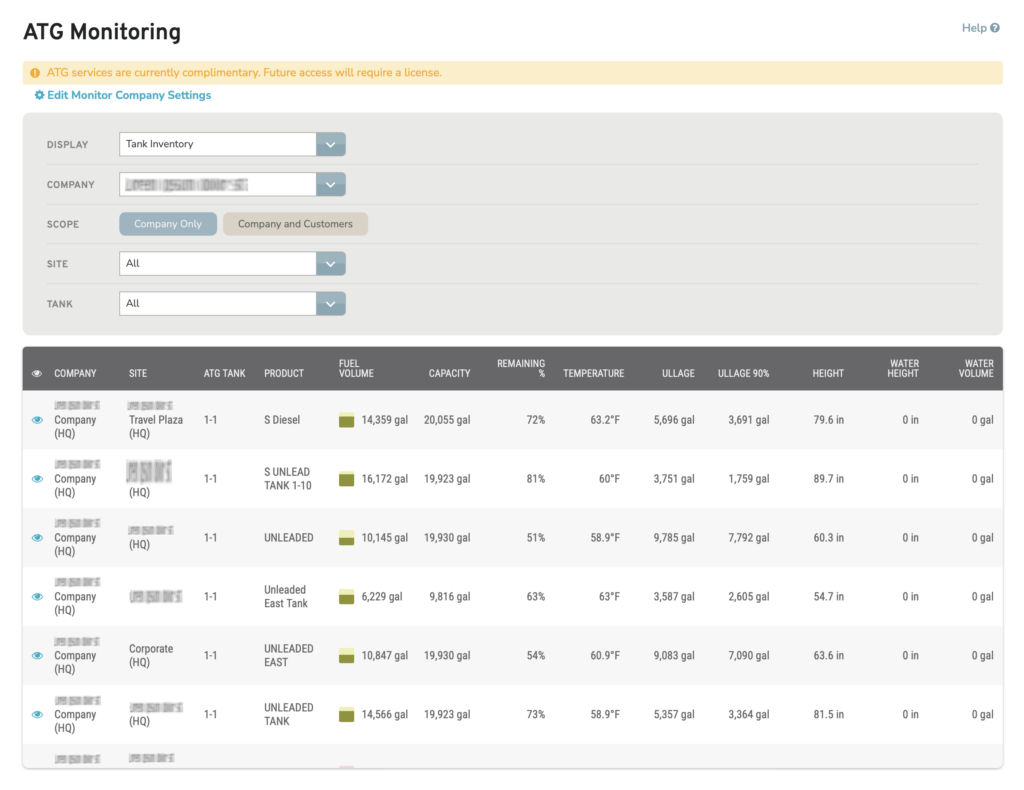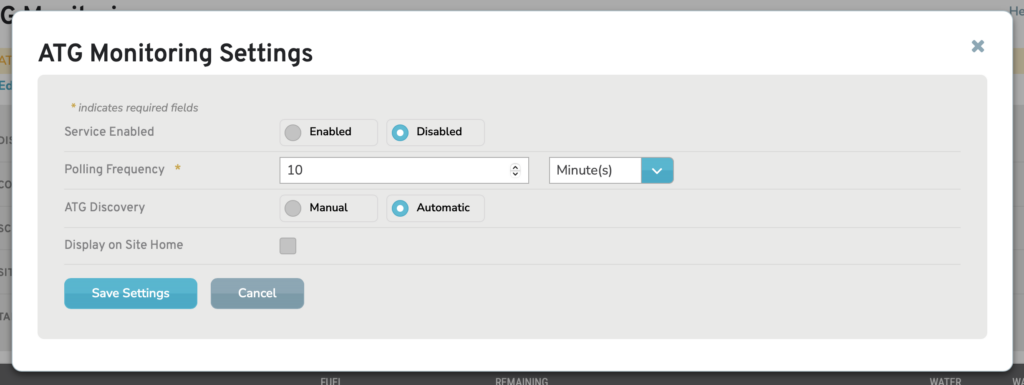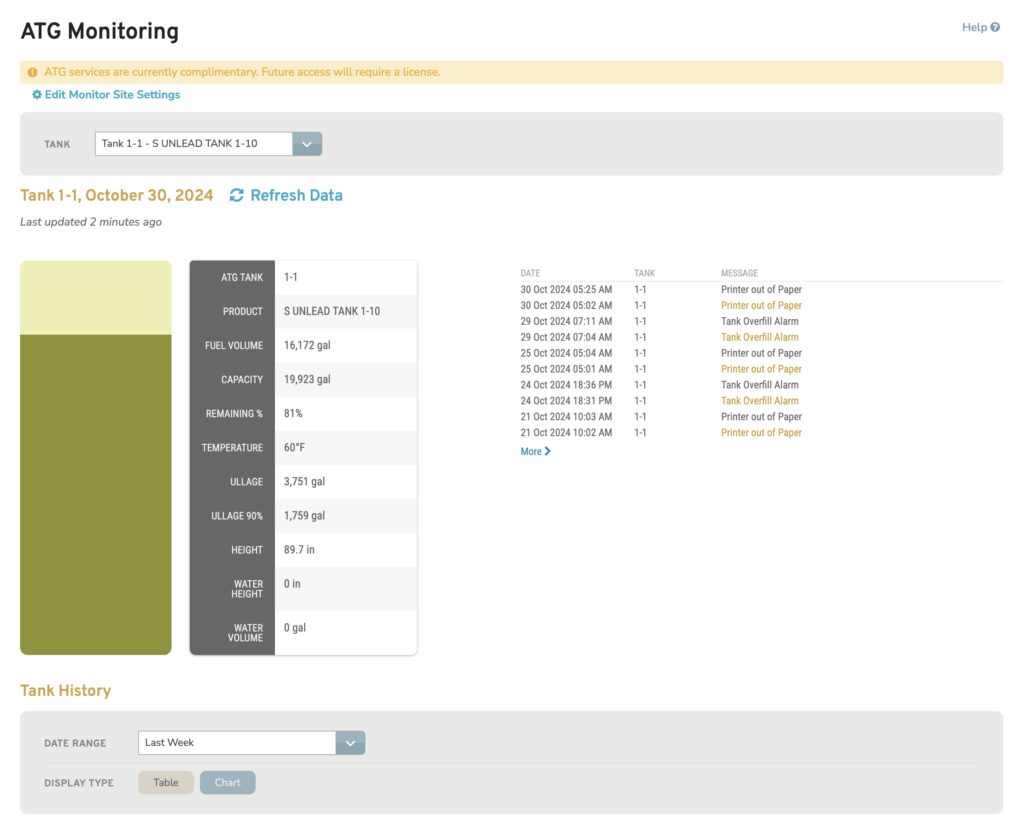Overview

Figure 1. Example Company SmartATG Page
The Company SmartATG page allows you to manage ATG monitoring settings and monitored tanks for the selected company. Company settings can be used to manage ATG monitoring for multiple sites at once, while site settings allow for custom configuration of individual sites.
Visit the Site SmartATG page to manage ATG monitoring settings for the selected site.
About Smart ATG
SmartATG is an Automatic Tank Gauge (ATG) monitoring feature in the Mako Central Management System (CMS) that provides secure remote access to ATG systems at distributed petroleum locations. An ATG system monitors fuel tank sensors to report data, such as fuel volume, water volume, and more.
Previously, customers with IP-enabled ATG devices had to open security pinholes in their network to allow for internet access to their ATG data. Now, the Mako System allows you to easily query these ATG devices from within your own network and to use this data in the Mako CMS or in external analytics systems.
Visit the API Data Streams page to manage ATG Streams for the selected company.
SmartATG monitoring is available as a complimentary preview. Future access will require a license.
Edit ATG Monitoring Settings

Figure 2. Example ATG Monitoring Settings Form
To edit ATG monitoring settings for the selected company and any of its sites that inherit these settings, click the “Edit Monitor Company Settings” link. This will open the ATG Monitoring Settings form.
Service Enabled
Enabled
To explicitly enable SmartATG for the selected company and any inheriting sites, choose the “Enable” option, configure the other settings, then click the “Save Settings” button.
Disabled
To explicitly disable SmartATG for the selected company and any inheriting sites, choose the “Disabled” option, then click the “Save Settings” button. This is the default setting for companies.
Polling Frequency
Specify how often Mako CMS pages and API data streams automatically query ATG devices at the selected company’s inheriting sites.
ATG Discovery
Automatic
SmartATG uses “Automatic” discovery by default. In most cases, Mako devices can automatically identify connected ATG devices and acquire their data.
Manual
If SmartATG is not working properly when set to “Automatic” discovery, choose “Manual” to specify discovery settings manually for the selected company’s inheriting sites.
ATG Locations

Figure 3. Example Manual ATG Discovery Settings
For “Manual” discovery of an ATG device, click the “Add Row” button, then specify the Network, IP address, and Port values for the device in the new row. Repeat for all ATG devices at the selected company’s inheriting sites. Use the “-” button to remove devices, as needed.
Display on Site Home
Choose whether the Site Home page for the selected company’s inheriting sites should default to displaying a visual ATG tank summary instead of the map.
Save Button
Click the “Save Settings” button to save these settings for the selected company and any inheriting sites.
View Tank Inventory / Sensor Alerts

Figure 4. Example Tank Inventory List
Use the Tank Inventory and Sensor Alerts lists to view ATG data for the selected company’s tanks.
Click the “Refresh Data” link to query the ATG device manually for the latest ATG data.
Display
Tank Inventory
Choose Tank Inventory to view a list of the selected company’s tanks.
Use the Export links to export this ATG data in CSV or PDF format.
Sensor Alerts
Choose Sensor Alerts to view a list of sensor alerts for the selected company.
Company
Choose the company whose ATG data you want to view.
Scope
Choose whether or not to include ATG data from child companies (customers) of the company.
Site
Choose “All” to view ATG data from all sites or choose a single site to view its data.
Tank
Choose “All” to view ATG data from all tanks or choose a single tank to view its data.
View Tank Details

Figure 5. Example Tank Details
Use the Tank Details summary to view details for the selected tank.
Click the “Refresh Data” link to query the ATG device manually for the latest ATG data.
ATG Data
View the latest ATG data and a visual indicator of the fuel level for the selected tank.
Tank History
View a log of ATG messages for the selected tank. Choose a date range and whether to display as a table or chart.
